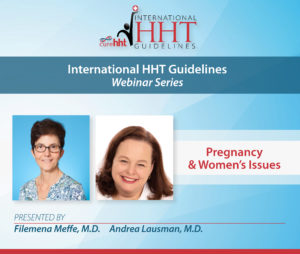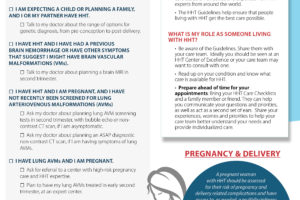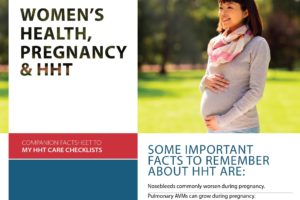International HHT Guidelines: Pregnancy and Women’s Issues (Recorded)
Dr. Andrea Lausman, Maternal Fetal Medicine Specialist, and Dr. Filomena Meffe, Chief, Department of Obstetrics and Gynecology, at the Toronto HHT Centre of Excellence discuss why pregnant woman with HHT should be assessed for their risk of pregnancy, delivery-related complications and have access to, as needed, a multidisciplinary maternal-fetal medicine team that includes HHT experts. Drs. Lausman takes the audience through the guidelines recommendations for screening and treatment while Dr. Meffe discusses how HHT may interact with menstrual issues. This one-hour webinar features 40 minutes of physician presentations immediately followed by an additional 20-minute Q&A session.
In addition, learn how to use the Cure HHT “My Pregnancy and Delivery Care Checklist” to ensure that the women in your family are receiving the best possible care for HHT. All HHT Care Checklists are available in our Comprehensive Guide to Managing Your HHT booklet – Request your complimentary copy today.
The International Guidelines for Patient Care page on the Cure HHT website provides a complete listing of all topic areas and resource materials.
Key points from webinar
- Pulmonary (lung) AVM screening recommended at 12-20 weeks; 85%-90% of complications of untreated PAVMs occur in the 2nd-3rd trimester
- Pregnant women with HHT who have no symptoms of Brain VMs do not require screening during pregnancy
- Pregnant women with HHT who have symptoms of Brain VMs should be screened in the 2nd trimester; in cases of prior BAVM bleeding the risk of re-bleeding is increased up to 30% in 2nd-3rd trimester and postpartum
- Hormonal therapies are available for treatment of gynecologic concerns and HHT
- Get Vaccinated! The COVID-19 vaccine is safe in pregnancy. Pregnant women who get COVID-19 have an increased risk of hospitalization and ICU admission; antibodies protect the mother and baby in utero and after birth




